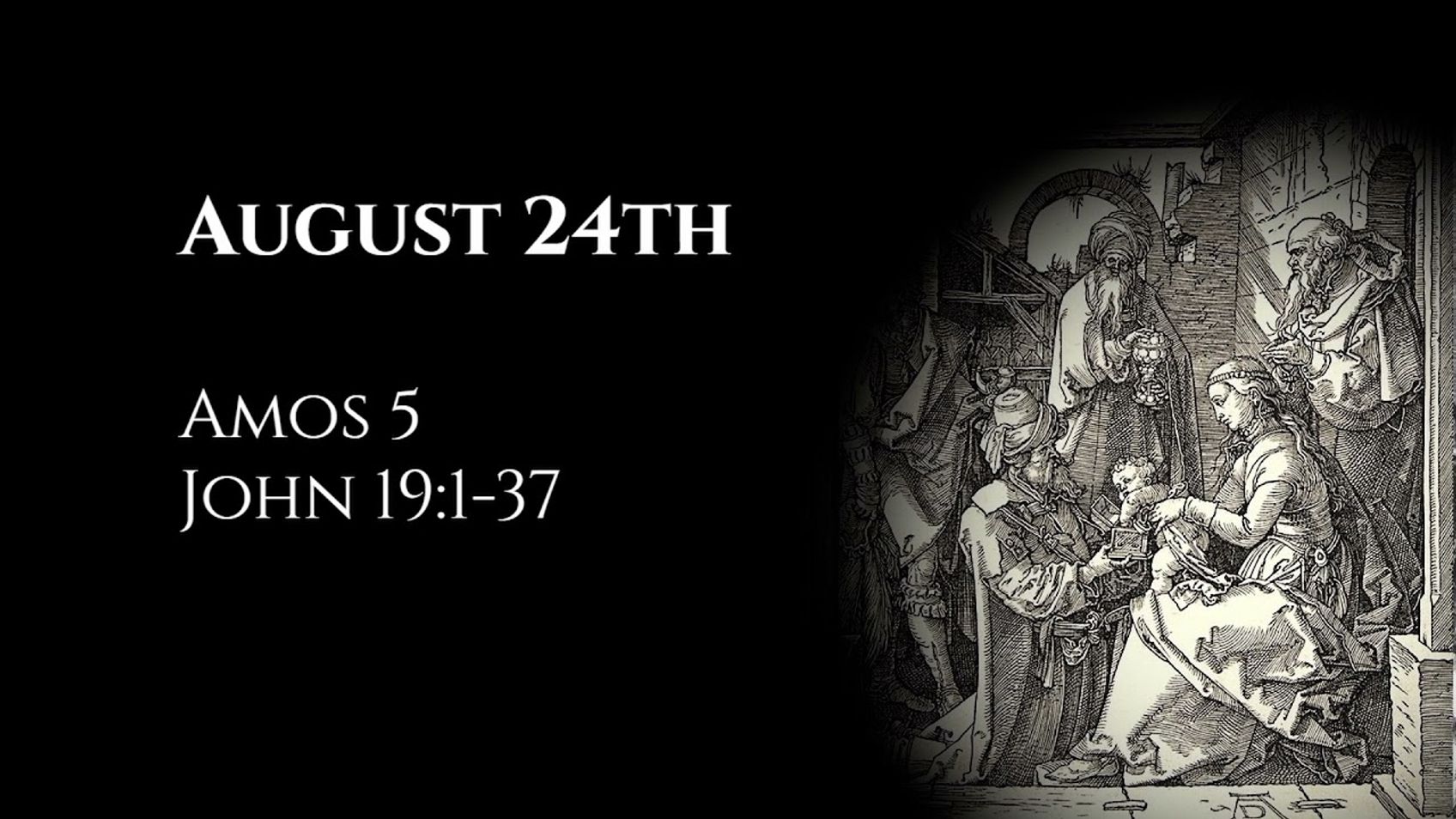August 24th: Amos 5 & John 19:1-37
August 23, 2021

Alastair Roberts
Let justice roll down like waters, and righteousness like an ever-flowing stream. Jesus on the cross.
My reflections are searchable by Bible chapter here: https://audio.alastairadversaria.com/explore/.
If you are interested in supporting this project, please consider supporting my work on Patreon (https://www.patreon.com/zugzwanged), using my PayPal account (https://bit.ly/2RLaUcB), or buying books for my research on Amazon (https://www.amazon.co.uk/hz/wishlist/ls/36WVSWCK4X33O?ref_=wl_share).
You can also listen to the audio of these episodes on iTunes: https://itunes.apple.com/gb/podcast/alastairs-adversaria/id1416351035?mt=2.
More From Alastair Roberts
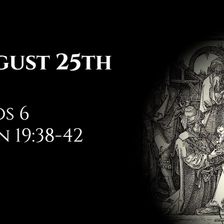
August 25th: Amos 6 & John 19:38-42
Alastair Roberts
August 24, 2021
The Lord's hatred of Israel's pride. The burial of Jesus.
My reflections are searchable by Bible chapter here: https://audio.alastairadversaria.com/e
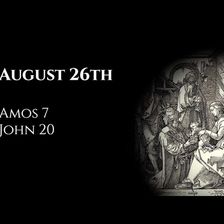
August 26th: Amos 7 & John 20
Alastair Roberts
August 25, 2021
Amos' first three visions. The resurrection of Jesus.
My reflections are searchable by Bible chapter here: https://audio.alastairadversaria.com/explo
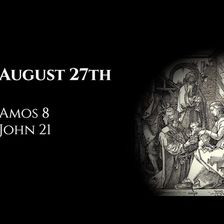
August 27th: Amos 8 & John 21
Alastair Roberts
August 26, 2021
The appearance of Jesus by the Sea of Tiberius. The vision of the summer fruits.
My reflections are searchable by Bible chapter here: https://audio.a
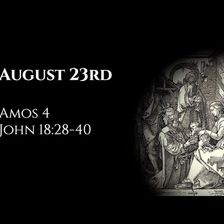
August 23rd: Amos 4 & John 18:28-40
Alastair Roberts
August 22, 2021
Unheeded warnings to Israel. Jesus before Pilate.
My reflections are searchable by Bible chapter here: https://audio.alastairadversaria.com/explore/.

August 22nd: Amos 3 & John 18:1-27
Alastair Roberts
August 21, 2021
The Lord God has spoken; who can but prophesy? The denial of Peter.
My reflections are searchable by Bible chapter here: https://audio.alastairadvers
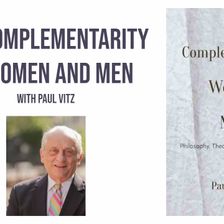
The Complementarity of Women and Men (with Paul Vitz)
Alastair Roberts
August 21, 2021
Paul Vitz is the Professor Emeritus of Psychology at New York University. He is a Catholic scholar, whose work explores the relationship between psych
More on OpenTheo

Protestants and Catholics: What’s the Difference? With Chad Van Dixhoorn, Blair Smith, and Mark McDowell
Life and Books and Everything
November 26, 2025
How should Protestants think about the Catholic Mass? About the Eucharist? About the history and development of the papacy? In this panel discussion,

Does God Really Need a “Pound of Flesh” to Forgive Sins?
#STRask
January 12, 2026
Questions about how to answer the challenge that God doesn’t need a “pound of flesh” to forgive sins but can simply forgive, and whether the claim in

Conservatism and Religious Freedom with John Wilsey
Life and Books and Everything
October 27, 2025
What is conservatism? And why does it go hand in hand with religious freedom? How should we think about the American experiment of ordered liberty? Ha

Are You Accursed If You Tithe?
#STRask
December 15, 2025
Questions about whether anyone who tithes is not a Christian and is accursed since Paul says that if you obey one part of the Mosaic Law you’re obliga

Is It a Sin to Feel Let Down by God?
#STRask
November 6, 2025
Questions about whether it’s a sin to feel let down by God and whether it would be easier to have a personal relationship with a rock than with a God

Why Is It Necessary to Believe Jesus Is God?
#STRask
February 19, 2026
Questions about why it’s necessary to believe Jesus is God, whether belief in the Trinity is required for salvation, and why one has to believe in the

How Can We Know Who Is Teaching the Same Gospel Paul Taught?
#STRask
February 16, 2026
Questions about how we can know who is teaching the same gospel Paul taught, and whether or not Jeremiah 1:5 supports the idea that we pre-existed in

Is 1 Corinthians 12:3 a Black-and-White Tool for Discernment?
#STRask
October 27, 2025
Questions about whether the claim in 1 Corinthians that “no one can say ‘Jesus is Lord’ except in the Holy Spirit” is a black-and-white tool for disce

Sense, Sensibility, and Adam Smith with Jan Van Vliet
Life and Books and Everything
February 16, 2026
This year is a special anniversary for the United States as Americans celebrate 250 years of independence. But 1776 was an important year in more ways

The Man on the Middle Cross with Alistair Begg
Life and Books and Everything
November 10, 2025
If you haven’t seen the viral clip, go see it right now. In this episode, Kevin talks to Alistair about the preaching clip he didn’t intend to give, h

Christmas Cranks and Christmas Blessings with Justin Taylor and Collin Hansen
Life and Books and Everything
December 17, 2025
If you are looking for a podcast where three friends talk about whatever they want to talk about and ramble on about sports, books, and grievances, th

Why Would Any Rational Person Have to Use Any Religious Book?
#STRask
December 8, 2025
Questions about why any rational person would have to use any religious book, whether apologetics would be redundant if there were actually a good, un

How Do I Determine Which Topics at Work Are Worth Commenting On?
#STRask
January 5, 2026
Questions about how to determine which topics at work are worth commenting on, and a good way to respond when you’re in a group Bible study and hear e

Why Do We Say Someone Was Saved on a Particular Date If It Was Part of an Eternal Plan?
#STRask
November 24, 2025
Questions about why we say someone was saved on a particular date if it was part of an eternal plan, the Roman Catholic view of the gospel vs. the Bib

Why Should We Pray If God Already Knows What’s Going to Happen?
#STRask
January 29, 2026
Questions about why we should pray if God already knows what’s going to happen, how the effectiveness of prayer is measured, and whether or not things
